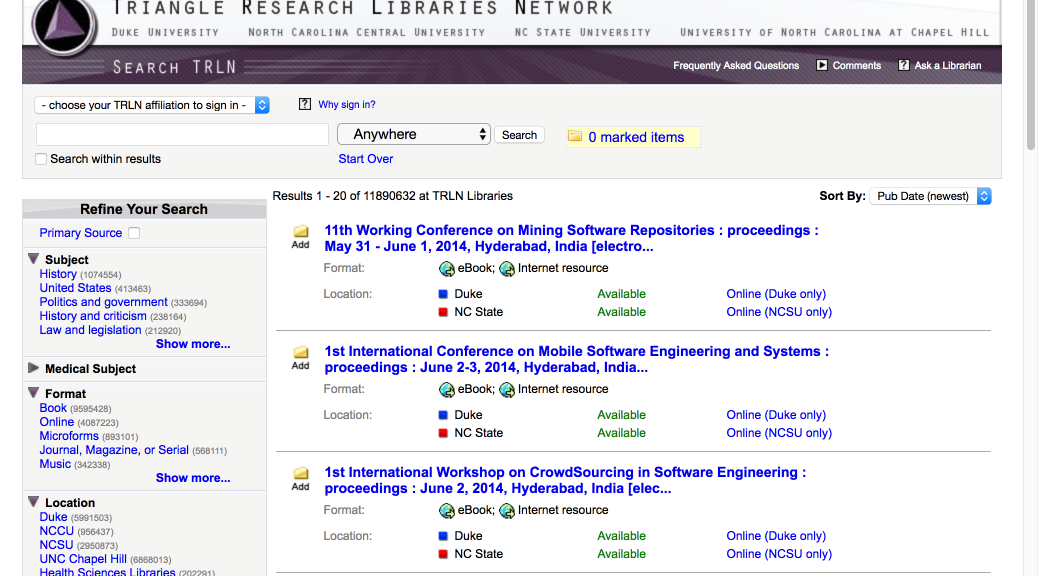We are still many months (well, OK — a year or more) away from unplugging the servers that keep the Endeca powered Search TRLN catalog and our local catalogs alive. But in the meantime work is well underway on its replacement. For those who don’t know, the libraries of Duke, UNC Chapel Hill, NC State, and NCCU have for many years maintained a shared catalog to make resources for all Triangle research libraries easily available to our communities. We all push our records to a centralized data pipeline that indexes our data in Endeca and even share much of the code that runs our local catalog user interfaces. While the browsing and searching capabilities of Endeca were innovative for library catalogs at the time, the rest of the library world has caught up and there are numerous open source solutions to providing convenient and powerful search and browse access to our holdings.
Some goals for the replacement for the Endeca based shared catalog system include:
- Maintain functionality of the current catalog, including search & browse features.
- Architect the new system so that it’s easier for staff to troubleshoot problems and test changes to the data pipeline.
- Use open source tools already in common use by peer libraries to take advantage of community effort and knowledge.
- Develop a platform that makes it easy for each institution to host their own copy of the catalog UI, that takes advantage of shared features and code, while allowing for local customization where needed.
- Provide a centralized data service and index that can process and host all 12 million or so records from each institution that will provide the back end index for all local catalogs. (NCCU will use a separate vended solution for their catalog.)
The large team of librarians and staff from across the Research Triangle libraries have been hard at work planning for the new system and many characteristics of the new system are becoming clear:
- We will use Solr as the replacement for Endeca. Solr will store and index our collective holdings and provide search and browse access to our holdings for our catalog applications.
- Blacklight, a UI built to search and browse a Solr Index will provide the basis for our local catalogs. Blacklight is used by Stanford, Cornell, and many other libraries to provide the user interface to their catalogs.
- We will build a Rails Engine that will add to Blacklight any customizations needed to support the consortial catalog and any additional features that the institutions want to share. This engine will make it easy to build a new Blacklight based catalog that will work with the TRLN Solr Index.
- The data pipeline, Solr index and Catalog UI will be packaged in such a way that staff can run a near copy of the production system locally to develop and test changes.
What we have so far:
- Scripts built with Traject that will take our MARC XML or MARC Binary records and transform them into an intermediate JSON format.
- Scripts that take the JSON data and index the data in Solr.
- The beginnings of a Rails engine that will form the basis of our Blacklight catalog user interfaces.
The technical implementation team is using the TRLN GitHub account to collaborate on development, and much work-in-progress code is posted there. There is still plenty of work left to do, a long list of requirements to accommodate and many unanswered questions, but the project is well underway to build the next shared catalog for the Triangle Research Libraries.





